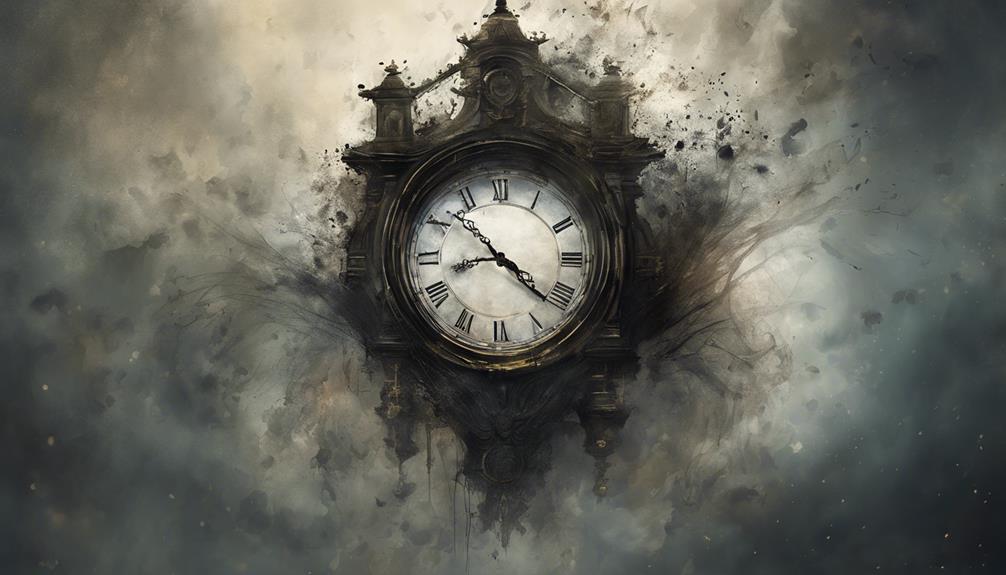When Do the Influences of the Previous Age Fade Away?

The influences of the previous age fade away gradually as society embraces new ideas and trends.
This process shapes the future with a blend of tradition and innovation.
Historical Shifts in Cultural Paradigms
Embrace the profound transformations that have shaped cultural paradigms through the ages. Cultural revolutions have been catalysts for change, each revolution deeply rooted in historical context. From the Renaissance to the Industrial Revolution, society has witnessed generational shifts that have propelled societal evolution. The essence of these shifts lies in the ability of each generation to challenge the norms of the past, paving the way for new ideologies to emerge.
As generations pass, the torch of change is carried forward, illuminating the path towards progress. The ebbs and flows of cultural paradigms are a testament to the resilience of humanity in the face of adversity. Each era brings with it a unique perspective, a fresh lens through which to view the world. It's within these shifts that the true essence of freedom lies – the freedom to question, to challenge, and to redefine the boundaries of societal norms.
In the tapestry of history, the threads of cultural evolution are intricately woven, creating a rich tableau of human experience. As you navigate through the currents of time, remember that you're part of a larger narrative, one that's shaped by the echoes of the past and the promise of the future.
Evolution of Technological Landscapes
Embrace the ever-changing tapestry of technological landscapes, where innovation cycles dictate the rhythm of progress.
Witness the ebb and flow of digital adoption rates, shaping the very fabric of our interconnected world.
Confront the challenges posed by legacy systems, a testament to the enduring legacy of past technological eras.
Tech Innovation Cycles
The evolution of technological landscapes unfolds in intricate cycles, weaving together innovation, adaptation, and obsolescence in a relentless march towards progress. In this dynamic realm of tech innovation, where change is the only constant, you find yourself navigating through waves of transformation and evolution.
The journey through these cycles can be both exhilarating and challenging, shaping the world around you in profound ways. Embrace this era of rapid change with an open mind and a bold spirit, for it's through these cycles that the future is being forged.
- Embrace the unknown with courage and curiosity.
- Navigate the waves of change with resilience and adaptability.
- Embrace innovation fatigue as a sign of growth and renewal.
Digital Adoption Rates
In the ever-evolving landscape of technological progress, your journey now leads you to explore the realm of Digital Adoption Rates, a pivotal indicator of the ongoing evolution of tech landscapes.
The Adoption rates reveal the pace at which individuals or societies embrace new technologies, highlighting generational gaps and the Digital divide.
As you navigate through this terrain, consider the significance of cultural assimilation in the tech realm. Understanding how different cultures integrate technology sheds light on societal values and norms.
Embrace the freedom that comes with adapting to these changes, for it's through this process that you stay connected to the pulse of innovation. Stay mindful of the shifts in adoption rates; they're the compass guiding you through the digital transformation era.
Legacy System Challenges
Amidst the ever-evolving technological landscapes, you encounter the formidable challenges posed by legacy systems, a testament to the relentless march of progress. Modernization challenges loom large, demanding your attention and strategic prowess. In the realm of legacy system upgrades, you find yourself at a crossroads, balancing the nostalgia for the familiar with the necessity of embracing the new.
- Emotional Turmoil: Feelings of attachment and reluctance may surface as you contemplate leaving behind the systems that have served you for so long.
- Strategic Decision-Making: Each choice you make regarding legacy systems carries weight, impacting your organization's efficiency and adaptability.
- Technological Evolution: The pace of change waits for no one, urging you to keep pace with the rapidly advancing technological landscape.
Impact of Generational Perspectives
As you reflect on the ever-changing landscape of generational perspectives, it becomes evident that new viewpoints are essential for progress.
Embrace the shifting mindsets and values that pave the way for cultural evolution.
It's through these diverse perspectives that we can navigate the complexities of our modern world with wisdom and understanding.
Time for New Perspectives
Embracing the evolving perspectives of different generations is imperative for navigating the changing landscape of society with wisdom and foresight. In this era of shifting paradigms and fresh outlooks, it's essential to welcome new perspectives to foster growth and understanding.
Here are three poignant reasons why embracing diverse generational viewpoints can enrich your life:
- Cultivate empathy: Understanding different generational perspectives can foster empathy and compassion, leading to stronger connections with those around you.
- Encourage innovation: Embracing varied viewpoints can spark creativity and innovation, driving progress and positive change in society.
- Promote unity: By valuing and respecting the perspectives of all generations, we can work towards a more harmonious and united world.
Changing Mindsets and Values
Navigating the changing landscape of society with wisdom and foresight entails recognizing the impact of generational perspectives on shifting mindsets and values. As time progresses, value shifts and mindset evolution become more apparent, shaping the way individuals perceive the world around them. Embracing these changes can lead to a deeper understanding of oneself and others, fostering a sense of harmony and acceptance within society. Below is a table illustrating the contrast between traditional and modern values:
| Traditional Values | Modern Values |
|---|---|
| Conformity | Individuality |
| Hierarchical | Equality |
| Stability | Innovation |
| Materialism | Sustainability |
Evolving Cultural Norms
Evolving cultural norms reflect the dynamic interplay of generational perspectives, shaping society's collective consciousness and behavioral patterns. As societal expectations shift and cultural assimilation takes place, individuals are faced with the challenge of navigating a world that's in constant flux.
Consider the following:
- Embrace change: Cultures evolve, and it's essential to adapt and embrace new norms with an open mind.
- Challenge stereotypes: Break free from the constraints of outdated societal expectations and challenge stereotypes that limit individual growth.
- Foster inclusivity: Cultivate a culture of inclusivity where diversity is celebrated, and differences are respected, creating a more harmonious and accepting society.
Societal Acceptance of New Norms
In the realm of societal norms, adaptation to new ways of thinking and behaving is a natural progression that reflects the ever-changing landscape of human interactions and beliefs. Societal acceptance of new norms often encounters varying degrees of resistance, stemming from entrenched cultural values and traditions. However, as time progresses, these norms tend to undergo a process of cultural assimilation, gradually integrating into the fabric of society.
Normative shifts, characterized by changes in accepted behaviors and beliefs, can sometimes lead to generational divides. Younger generations, more inclined to embrace innovation and progress, may find themselves at odds with older generations who are more rooted in traditional values. This clash of perspectives is a common phenomenon in the evolution of societal norms, serving as a catalyst for introspection and growth.
As society navigates the complexities of embracing new norms, it's essential to foster open dialogue and mutual respect among individuals with differing viewpoints. Embracing diversity of thought and experience paves the way for a more inclusive and harmonious coexistence, where freedom of expression and acceptance of change are celebrated.
Economic Influences on Cultural Change
Economic forces wield significant influence in shaping cultural transformations, acting as powerful catalysts for change and adaptation within societies. When economic globalization sweeps across nations, it often brings with it the tide of cultural assimilation, where traditional practices and beliefs meld into a more homogenized global culture. On the other hand, in times of economic stagnation, the desire for cultural preservation becomes paramount, as communities cling to their heritage and customs as a source of identity and resilience against external pressures.
- Cultural assimilation: The rapid pace of economic globalization can sometimes lead to the erosion of unique cultural identities, causing a sense of loss and displacement among communities.
- Cultural preservation: During periods of economic stagnation, the emphasis on preserving cultural heritage intensifies, serving as a beacon of tradition and strength in the face of uncertainty.
- The delicate balance: Finding the equilibrium between embracing economic opportunities and safeguarding cultural roots is a challenge that societies grapple with, requiring thoughtful navigation to ensure a harmonious coexistence of progress and tradition.
Media's Role in Shaping Public Opinion
The media's influence on shaping public opinion is a formidable force that resonates deeply within the fabric of society. Through its power to disseminate information and narratives, the media holds a significant sway over public perception. However, this influence isn't without its complexities. Media bias, whether intentional or unintentional, can skew the way events are portrayed, thereby shaping how individuals interpret and understand the world around them.
In today's interconnected world, where information is constantly at our fingertips, it's more crucial than ever to critically analyze the sources of information we consume. Understanding the potential for bias in media reporting is essential in forming a well-rounded perspective on current events. By being discerning consumers of media, individuals can guard against the manipulation of public opinion and strive for a more balanced understanding of the world.
In a society that values freedom of thought and expression, it's imperative to recognize the role that the media plays in shaping public discourse. By remaining vigilant against media bias and actively engaging with a diverse range of sources, individuals can contribute to a more informed and enlightened public sphere.
Cultural Relevance in Contemporary Society
Embracing the multifaceted tapestry of cultures enriches contemporary society, fostering understanding and unity among diverse communities. In a world shaped by globalization effects, cultural assimilation is inevitable, but it's crucial to appreciate and respect the uniqueness of each culture.
- Cultural Appropriation: The fine line between appreciation and appropriation is often blurred in today's society. It's essential to engage with cultures respectfully, acknowledging their significance without exploiting or misrepresenting them.
- Social Media Trends: Social media platforms wield immense influence in shaping cultural narratives. As individuals, we must use these platforms responsibly, promoting inclusivity and celebrating cultural diversity rather than perpetuating stereotypes.
- Globalization Effects: While globalization has connected the world in unprecedented ways, it has also led to the erosion of some traditional cultural practices. It's imperative to preserve these cultural heritage elements while embracing the benefits of a globalized world.
Frequently Asked Questions
How Do Individual Personalities and Preferences Play a Role in Influencing Cultural Change?
In shaping cultural evolution, individual personalities wield immense power. Your unique personality traits guide preferences, sparking shifts that ripple through society. Embrace this influence; your choices sculpt the world around you, driving meaningful change.
Are There Any Specific Rituals or Traditions That Have Remained Unchanged Despite Shifting Cultural Paradigms?
In the tapestry of cultural continuity amidst societal shifts, certain timeless practices stand unwavering in the face of the modern world. Despite evolving landscapes, these enduring rituals and traditions remain steadfast, preserving heritage and wisdom.
How Does Globalization Impact the Fading Away of Previous Age Influences?
Globalization influences the fading of previous age traditions as cultural blending occurs. Modernization impacts traditional practices, leading to their gradual disappearance. Embrace the evolving world while cherishing the timeless essence of your heritage.
What Role Do Educational Institutions Play in Perpetuating or Challenging Traditional Norms?
In the dance of societal progress, educational institutions can be a steady partner, either clinging to traditional steps or embracing the rhythm of educational reform, leading a cultural revolution towards enlightenment and freedom.
Can Cultural Influences From Previous Ages Resurface or Re-Emerge in Contemporary Society?
Cultural revival and historical echoes often intertwine, leading to modern reinterpretations of past legacies. Embracing the complexities of tradition allows for a dynamic evolution where the essence of bygone eras can resurface in contemporary society.









